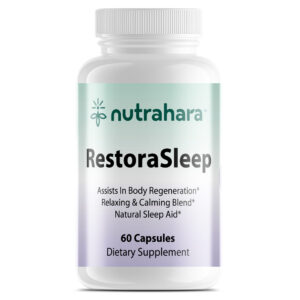
Nutrahara Blog
Nutrahara Blog
The Ultimate Guide to Heart Health for Women: Supplements, Lifestyle Changes, and More
1. Introduction: Why Heart Health for Women Matters
Heart health is often seen through a generalized lens, but for women, the journey to cardiovascular wellness is uniquely complex. While many assume that heart disease is more of a male issue, cardiovascular diseases claim more female lives each year than all cancers combined. A key reason why heart health for women deserves special attention lies in the subtle and non-traditional ways that heart issues manifest in them — symptoms like fatigue, shortness of breath, or anxiety are frequently dismissed as stress or exhaustion.
Women experience multiple hormonal shifts throughout their lives — from menstruation to pregnancy, perimenopause, and post-menopause — all of which impact heart function. During menopause, estrogen levels drop, causing changes in the blood vessels that can lead to increased cholesterol levels and stiffer arteries. Similarly, pregnancy complications such as preeclampsia, gestational diabetes, or postpartum hypertension can increase a woman’s lifetime risk of heart disease, yet this connection is rarely discussed. For more insights, see the CDC’s guide on women and heart disease.
2. 7 Natural Ways to Support Heart Health
Supporting heart health naturally involves a holistic approach that encompasses dietary choices, physical activity, and lifestyle habits. Here are seven effective strategies that women can adopt to promote cardiovascular wellness:
2.1 Incorporate Heart-Healthy Foods
- Fruits and Vegetables: Aim for a colorful plate filled with berries, leafy greens, and cruciferous vegetables. These are rich in antioxidants, vitamins, and minerals that help reduce inflammation and oxidative stress.
- Whole Grains: Switch to whole grains like quinoa, brown rice, and whole-wheat bread to boost fiber intake, which can lower cholesterol levels and improve heart health.
- Healthy Fats: Incorporate sources of omega-3 fatty acids such as fatty fish (salmon, mackerel), flaxseeds, and walnuts, which support heart function and reduce inflammation.
2.2 Stay Hydrated
- Water: Drinking adequate water helps maintain blood volume and circulation. Proper hydration also supports overall metabolic functions and can aid in weight management.
- Herbal Teas: Options like green tea and hibiscus tea have been shown to support heart health through antioxidant properties and can help lower blood pressure.
2.3 Manage Stress Through Mindfulness
- Yoga and Meditation: Regular practice of yoga and mindfulness meditation can significantly reduce stress and improve heart health. Techniques like deep breathing and progressive muscle relaxation help lower cortisol levels.
- Nature Walks: Spending time in nature not only uplifts mood but also lowers stress levels, making it easier to maintain healthy blood pressure.
2.4 Get Moving with Regular Exercise
- Aerobic Activities: Engaging in aerobic exercises like brisk walking, swimming, or cycling for at least 150 minutes a week can improve heart health by enhancing circulation and lowering blood pressure.
- Strength Training: Incorporating strength training exercises at least twice a week can increase muscle mass, boost metabolism, and support cardiovascular health.
2.5 Prioritize Sleep Quality
- Establish a Sleep Routine: Aim for 7-9 hours of quality sleep each night to support heart health. Good sleep hygiene, like maintaining a consistent schedule and creating a restful environment, is essential for cardiovascular wellness.
2.6 Limit Processed Foods and Sugar Intake
- Read Labels: Minimize consumption of processed foods high in trans fats, sodium, and added sugars, which contribute to inflammation and increase the risk of heart disease.
- Choose Whole Foods: Focus on whole, unprocessed foods that nourish the body and support heart health.
2.7 Consider Natural Supplements
- Omega-3 Fatty Acids: If dietary sources are insufficient, consider high-quality omega-3 supplements, which can support heart health by reducing triglyceride levels.
- Coenzyme Q10 (CoQ10): This powerful antioxidant supports energy production in heart cells and may improve blood vessel function.
Incorporating these natural strategies into daily life can significantly enhance heart health and reduce the risk of cardiovascular disease. Making small, sustainable changes can lead to profound long-term benefits, fostering a healthier and more vibrant life.
3. Yoga and Meditation: The Mind-Heart Connection
Yoga and meditation are powerful tools that not only promote mental well-being but also significantly enhance heart health. The connection between the mind and heart is profound, with stress and emotional turmoil directly impacting cardiovascular function. By integrating these practices into daily life, women can cultivate a sense of calm and balance that supports overall cardiovascular wellness.
3.1 The Stress-Heart Health Link
- Understanding Stress: Chronic stress triggers the body’s “fight or flight” response, leading to elevated cortisol levels and increased heart rate. Over time, this can result in hypertension, inflammation, and a higher risk of heart disease.
- Emotional Well-Being: Emotional stressors, such as anxiety and depression, can exacerbate cardiovascular problems. Prioritizing mental health through relaxation techniques is essential for heart health.
3.2 Benefits of Yoga for Heart Health
- Improved Circulation: Regular yoga practice promotes blood flow and oxygenation throughout the body, benefiting heart function. Poses such as Downward Dog and Cobra Pose can enhance circulation.
- Lower Blood Pressure: Research shows that yoga can effectively lower blood pressure, making it a natural intervention for women at risk of hypertension.
- Reduced Inflammation: Yoga has been linked to lower levels of inflammatory markers, which are crucial in preventing heart disease.
3.3 Essential Yoga Poses for Heart Health
- Bridge Pose (Setu Bandhasana): This pose opens the chest, improves circulation, and strengthens the back and legs, promoting heart health.
- Warrior II (Virabhadrasana II): This pose fosters stability and strength while encouraging deep, steady breathing, which supports cardiovascular health.
- Child’s Pose (Balasana): A restorative pose that calms the nervous system and helps reduce stress, promoting relaxation and heart health.
3.4 The Power of Meditation
- Mindfulness Meditation: Practicing mindfulness involves focusing on the present moment, helping to reduce anxiety and stress levels. This practice has been shown to lower blood pressure and improve heart rate variability.
- Loving-Kindness Meditation: This form of meditation promotes compassion and positive emotions, which can counteract stress and foster emotional well-being, contributing to heart health.
3.5 Creating a Daily Practice
- Start Small: Women can begin with just 5-10 minutes of yoga or meditation each day, gradually increasing the duration as comfort and familiarity grow.
- Consistency is Key: Establishing a routine, whether it’s morning sun salutations or evening meditation, helps build a sustainable practice that nurtures both mind and heart.
- Incorporate Breathing Exercises: Techniques such as deep breathing or pranayama can significantly reduce stress levels and enhance relaxation, further supporting heart health.
4. Exercise Routines That Promote Cardiovascular Fitness
Regular exercise is vital for maintaining heart health, especially for women who face unique cardiovascular risks throughout different life stages. Incorporating a variety of exercises into daily routines not only improves cardiovascular fitness but also enhances overall well-being. Here are several effective exercise routines that women can adopt to promote heart health.
4.1 Aerobic Exercises
- Brisk Walking: This low-impact activity is accessible for most women and can be easily incorporated into daily life. Aim for at least 150 minutes of brisk walking per week to improve cardiovascular endurance and lower blood pressure.
- Cycling: Whether on a stationary bike or outdoors, cycling is an excellent way to engage in aerobic exercise while being gentle on the joints. Aim for 30 minutes of moderate cycling several times a week.
- Swimming: A full-body workout, swimming strengthens the heart while minimizing strain on the body. This low-impact exercise is particularly beneficial for women with joint issues or those recovering from injuries.
4.2 High-Intensity Interval Training (HIIT)
- What is HIIT?: This form of training alternates between short bursts of intense activity and periods of rest or lower-intensity exercise. HIIT can be highly effective for improving cardiovascular fitness in a shorter amount of time.
- Sample Routine: A simple HIIT workout might include:
- 30 seconds of jumping jacks
- 30 seconds of rest
- 30 seconds of burpees
- 30 seconds of rest
- Repeat for 15-20 minutes.
4.3 Strength Training
- Benefits for Heart Health: Strength training helps build muscle mass, which is crucial for a healthy metabolism and maintaining a healthy weight—both of which contribute to heart health.
- Recommended Exercises: Focus on compound movements that engage multiple muscle groups, such as:
- Squats
- Lunges
- Push-ups
- Dumbbell rows
- Frequency: Aim for at least two strength training sessions per week, ensuring proper form and technique to prevent injury.
4.4 Flexibility and Balance Exercises
- Yoga and Pilates: These practices not only enhance flexibility and core strength but also support cardiovascular health by reducing stress and promoting mindfulness.
- Incorporate Stretching: Regular stretching can improve circulation and prevent injuries, making it easier to maintain a consistent exercise routine.
4.5 Tailoring Workouts to Individual Needs
- Listen to Your Body: It’s important for women to pay attention to how their bodies respond to different types of exercise and adjust their routines accordingly.
- Set Realistic Goals: Establish achievable fitness goals, whether it’s running a certain distance, lifting a specific weight, or attending a weekly fitness class.
- Stay Motivated: Engage in activities that are enjoyable, whether it’s joining a dance class, hiking with friends, or practicing martial arts. This helps maintain consistency and commitment to a heart-healthy lifestyle.
5. Lifestyle Changes for Long-Term Heart Health
Achieving and maintaining heart health involves more than just exercise and diet; it requires a holistic approach that integrates various lifestyle changes. By making conscious decisions in daily life, women can significantly reduce their risk of heart disease and enhance their overall well-being. Here are several key lifestyle changes to consider for long-term cardiovascular health.
5.1 Nutrition: Eat for Heart Health
- Emphasize Whole Foods: Focus on incorporating whole, unprocessed foods into the diet, such as fruits, vegetables, whole grains, lean proteins, and healthy fats.
- Reduce Sodium Intake: High sodium consumption can lead to elevated blood pressure. Limit processed and packaged foods, and opt for fresh ingredients when possible.
- Control Portion Sizes: Eating smaller portions can help manage calorie intake and prevent weight gain, which is a critical factor in heart health.
5.2 Maintain a Healthy Weight
- Body Mass Index (BMI): Aim for a healthy BMI (18.5–24.9) to reduce the risk of heart disease.
- Monitor Progress: Regularly track weight and body measurements to stay aware of any changes, making adjustments as needed to maintain a healthy weight.
5.3 Quit Smoking and Limit Alcohol
- Stop Smoking: Tobacco use is a major risk factor for heart disease. Seek support through cessation programs or resources to quit smoking.
- Limit Alcohol Intake: If consumed, alcohol should be in moderation—up to one drink per day for women—to minimize its impact on heart health.
5.4 Manage Stress Effectively
- Identify Stressors: Recognize sources of stress in daily life and explore ways to manage them. This could include setting boundaries, delegating tasks, or seeking help from professionals.
- Practice Relaxation Techniques: Incorporate practices like deep breathing, progressive muscle relaxation, or mindfulness to effectively manage stress and anxiety levels.
5.5 Get Quality Sleep
- Prioritize Sleep Hygiene: Aim for 7–9 hours of quality sleep each night. Establish a relaxing bedtime routine, and create a comfortable sleep environment.
- Address Sleep Disorders: Seek medical advice if experiencing chronic sleep issues, as conditions like sleep apnea can negatively impact heart health.
5.6 Regular Health Check-Ups
- Monitor Blood Pressure and Cholesterol: Regular screenings are essential for early detection of potential heart health issues. Aim to have blood pressure and cholesterol levels checked at least once a year.
- Discuss Heart Health with Healthcare Providers: Open communication with healthcare professionals can help develop personalized strategies for maintaining heart health based on individual risk factors.
5.7 Build a Supportive Community
- Engage in Social Activities: Connect with friends, family, and community groups that promote healthy lifestyles. Social support can be crucial in maintaining motivation and accountability.
- Consider Group Exercise Classes: Joining fitness classes or clubs can foster camaraderie while encouraging a consistent exercise routine.
6. Real-Life Testimonials: Women Who Transformed Their Heart Health
Inspiring stories of women who have successfully transformed their heart health serve as powerful motivators for others. These testimonials highlight the impact of lifestyle changes, exercise, and mindfulness practices on cardiovascular wellness.
6.1 Maria’s Journey: From Sedentary to Active
Maria, a 52-year-old mother of three, struggled with fatigue and high blood pressure. After attending a health seminar, she decided to make significant lifestyle changes.
- Action Steps:
- Started walking for 30 minutes daily
- Incorporated more fruits and vegetables into her diet
- Joined a local yoga class for stress relief
- Results: Within six months, Maria lost 20 pounds, her blood pressure normalized, and she felt more energetic and vibrant than ever.
6.2 Susan’s Story: Overcoming Stress
At 45, Susan faced mounting stress from her job and family responsibilities, leading to anxiety and elevated cholesterol levels.
- Action Steps:
- Introduced mindfulness meditation into her daily routine
- Committed to regular aerobic workouts three times a week
- Reduced processed food consumption
- Results: After a year of dedication, Susan’s cholesterol levels decreased, and she reported feeling calmer and more in control of her life.
6.3 Jane’s Transformation: Heart Health After Menopause
After experiencing menopausal symptoms and weight gain, Jane, 60, recognized the need for change.
- Action Steps:
- Consulted a nutritionist to develop a heart-healthy meal plan
- Participated in a community exercise group focused on strength training
- Prioritized quality sleep and stress management
- Results: Jane successfully lost weight, improved her energy levels, and significantly reduced her risk factors for heart disease.
7. Supplements for Heart Health: What Science Says
When it comes to heart health, a well-balanced diet is foundational, but supplements can play a complementary role in supporting cardiovascular wellness. Various supplements have been studied for their potential benefits in promoting heart health, particularly for women who may face unique risk factors throughout their lives. Here, we explore some of the most researched supplements for heart health and what the science says about them.
7.1 Omega-3 Fatty Acids
- Benefits: Omega-3 fatty acids, primarily found in fish oil, are known for their anti-inflammatory properties and ability to lower triglyceride levels. They can also help reduce the risk of arrhythmias (irregular heartbeats).
- Research Findings: Studies have shown that regular omega-3 supplementation can lead to significant reductions in cardiovascular events, making it a valuable addition to a heart-healthy regimen.
7.2 Coenzyme Q10 (CoQ10)
- Benefits: CoQ10 is an antioxidant that plays a crucial role in energy production within cells. It is particularly beneficial for heart health, as it helps improve blood vessel function and reduces oxidative stress.
- Research Findings: Research indicates that CoQ10 supplementation can lower blood pressure and improve symptoms of heart failure, especially in older adults or those on statin medications, which can deplete natural CoQ10 levels.
7.3 Magnesium
- Benefits: Magnesium is essential for maintaining normal heart rhythm, regulating blood pressure, and supporting muscle function. It also helps manage stress levels, contributing to overall heart health.
- Research Findings: Studies suggest that higher magnesium intake is associated with a lower risk of cardiovascular disease, particularly in women.
7.4 Fiber Supplements
- Benefits: Soluble fiber can help lower cholesterol levels and improve blood sugar control. Psyllium husk is a common fiber supplement that is effective in promoting heart health.
- Research Findings: Evidence supports that fiber supplementation can lead to reductions in LDL cholesterol levels, providing a protective effect against heart disease.
7.5 Plant Sterols and Stanols
- Benefits: These naturally occurring substances found in plants can help block cholesterol absorption in the intestines, leading to lower LDL cholesterol levels.
- Research Findings: Studies show that consuming 2 grams of plant sterols or stanols daily can reduce LDL cholesterol by about 5-15%, making them effective adjuncts to dietary changes for heart health.
7.6 Turmeric and Curcumin
- Benefits: Curcumin, the active compound in turmeric, has potent anti-inflammatory and antioxidant properties, which can benefit heart health by reducing inflammation in blood vessels.
- Research Findings: Preliminary studies indicate that curcumin supplementation may improve endothelial function and lower risk factors associated with heart disease.
8. Conclusion: Taking Charge of Your Heart Health
Empowering women to take charge of their heart health is essential for fostering a lifetime of well-being. Understanding the unique cardiovascular risks that women face throughout their lives is the first step toward proactive care. By embracing a holistic approach that combines education, lifestyle changes, and self-care practices, women can significantly reduce their risk of heart disease and enhance their quality of life.
Taking charge of heart health is not just about making changes—it’s about fostering a resilient mindset that embraces wellness at every stage of life. By prioritizing heart health, women can empower themselves to live vibrantly, confidently, and fully, setting an example for future generations to follow.
Written by the Nutrahara Team
This article was developed by the Nutrahara team of nutrition scientists and naturopaths, who specialize in formulating safe, effective, and science-backed supplements for women’s health. Every ingredient we use is carefully selected to support your body’s unique needs—naturally. Follow us on LinkedIn for expert insights and updates on our latest wellness solutions.
















